- Home
- Sustainability
- Environment
- Sustainable Forest Management
- Forestry Business Overseas
Forestry Business Overseas
Basic Policy
The Sumitomo Forestry Group is expanding its forestry business in consideration of local communities and the environment. The Group contributes to a stable supply of wood and regional economic development while maintaining the wider environment through management of "Economic Forests" which are planted forests for wood production, the preservation of "Protected Forests", which are responsible for ecosystem conservation and CO2 absorption and fixation, and coexistence with surrounding "Local Communities".
Overseas Managed Afforestation Area (unit: ha)
| Country | Name of Forestry Business | Managed Area | Production Area | Afforestation Area in FY2024 | Logged Area in FY2024 |
|---|---|---|---|---|---|
| Indonesia | PT. Mayangkara Tanaman Industri (MTI) | 104,664 | 10,534 | 1,983 | 1,637 |
| PT. Wana Subur Lestari (WSL) | 40,750 | 11,451 | 2,907 | 3,189 | |
| PT. Kubu Mulia Forestri (KMF) | 9,270 | 5,688 | 2,548 | 2,922 | |
| PT. Kutai Timber Indonesia (KTI) | 5,505 | 5,505 | 24 | 831 | |
| PT. BINA OVIVIPARI SEMESTA (BIOS) | 9,738 | 0 | 0 | 0 | |
| Subtotal | 169,927 | 33,178 | 7,462 | 8,579 | |
| Papua New Guinea | Open Bay Timber Ltd. (OBT) | 31,260 | 11,618 | 362 | 334 |
| New Zealand | Tasman Pine Forests Ltd. (TPF) | 35,695 | 25,211 | 708 | 817 |
| Total | 236,882 | 70,070 | 8,532 | 9,730 | |
Forestry Business Overseas
The Sumitomo Forestry Group is expanding three approaches to conducting forestry business; industrial tree plantation, environmental reforestation, and social forestry. The purpose of industrial tree plantation is to produce wood and increase the supply of afforestation wood (raw material). By zoning its managed land appropriately, the Group aims to achieve both the conservation of valuable ecosystems and the development of local communities through forestry business.
In addition, the Group also conducts environmental reforestation, planting trees for environmental conservation. It aims to contribute to environmental conservation through the expansion of forested areas and the fulfillment of the ecosystem services function of forests, by actively planting trees on land where natural regeneration would otherwise be difficult. The Group has also been engaged in "social forestry" which shares the economic benefits of afforestation with local communities while enlisting the cooperation of local residents.
Distribution and Area of Overseas Forestry Business Sites (as of end of December 2024)
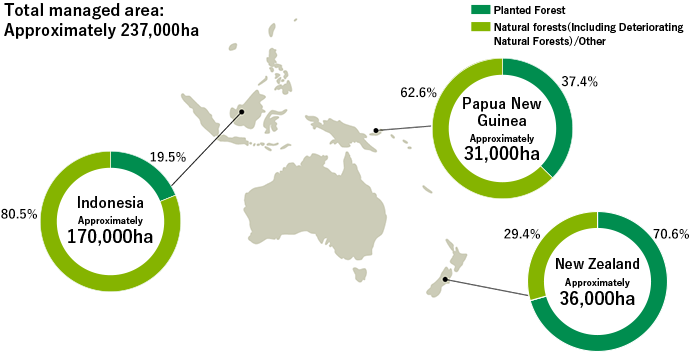
Forest Certification and Sustainable Forestry Business
Of an approximately 31,000-hectare planted forest owned and managed by Papua New Guinea‘s Open Bay Timber (OBT), about two-thirds, or 20,000 hectares, has received FSC® forest certification*. After harvest, the company ensures afforestation is carried out, and in fiscal 2024, 362 hectares of trees were planted.
The entire area of approximately 36,000 hectares managed by Tasman Pine Forests Ltd. (TPF) in New Zealand has been FSC®-FM certified*. In fiscal 2024, TPF implemented 708 hectares of afforestation.
We will continue to practice sustainable forest management that lays basis for communities and environment to function in harmony.
*OBT holds CW certification FSC-C019117, FM certification FSC-C103694 and TPF holds FM certification FSC-C132002
Forestry Business in West Kalimantan, Indonesia (Industrial Tree Plantation)
In 2010, Sumitomo Forestry established PT. Mayangkara Tanaman Industri (MTI) and PT. Wana Subur Lestari (WSL) in collaboration with Alas Kusuma Group, an Indonesian forest management and plywood manufacturing company. They have been developing large-scale afforestation projects in West Kalimantan Province under "License for Industrial Afforestation and Timber Product Utilization Project (UPHHK-HTI)*1" issued by the Indonesian Ministry of Environment and Forestry. Regarding management form, investment ratio was sequentially increased, and WSL and MTI became 100% subsidiaries of the Sumitomo Forestry Group in July 2021.
In addition, since 2020, we have started forestry business at Kubu Mulia Forestry (KMF), which is close to WSL and MTI.
Since 2022, PT. BINA OVIVIPARI SEMESTA (BIOS) (Headquarters: Kubu Raya District, West Kalimantan Province, Indonesia) has been working to create blue carbon credits through conservation of mangrove*2 forests.
Background
The afforestation sites of WSL, MTI, and KMF covers areas in which forest degradation has advanced due to commercial harvesting from the 1960s to the mid-1990s in addition to repeated illegal logging and slash-and-burn farming practices.
We believe that from a sustainability perspective, it is a very significant business to responsibly conserve forests with high conservation value and provide local residents with an economic foundation through our business, while producing wood as a profit-making activity on these types of lands.
The land used in these operations is located in tropical peatlands which play an extremely vital role in the carbon and water cycle on a global scale.
Sustainable Forest Management
We launched these operations by conducting topographical surveys, and boring tests to understand the peat distribution, over five years. Based on the survey results, sustainable water storage-type peatland management was achieved by creating waterways and dams that were designed with consideration of the terrain. We also entered into an advisory agreement with the International Finance Corporation (IFC), the World Bank's group institute, in 2012. In accordance with the concept of High Conservation Values Forests (HCVF)*3, Sumitomo Forestry conducted assessments on its operational properties with the IFC and investigated whether the property use plan is implemented as stated and adequate consideration is made for biodiversity and livelihood of local residents. The survey report has also undergone peer review by a third-party organization, and the valuable feedback from these stakeholders has contributed to zoning areas for forest conservation and afforestation projects, the creation of management according to each area's role, and the establishment of "green corridors" that allow rare wildlife to move freely. Our Group also held public hearings in 2013 where stakeholders such as local residents, companies in the communities, academics, NGOs, and government officers were invited to share the results of the investigations.
Our employees' unified and efforts have succeeded in building a unique peatland management model that stabilizes the underground water level throughout one year. Stabilization of the underground water level reduces greenhouse gas emissions and forest fires, while maintaining proper hydrological cycles, thereby making a significant contribution to climate change mitigation. Our peatland management model has been highly praised worldwide.
These and surrounding areas also isolate ecosystems where rare plant and animal species live in an island-like shape. To prevent this type of isolation, the Sumitomo Forestry Group works together with neighboring local business proprietors to preserve the entirety of the ecosystem.
The Sumitomo Forestry Group captures tropical peatlands and the ecosystems living throughout the peatlands as one type of important natural capital. In the future, businesses achieving a balance between industrial tree plantations and environmental protection will enhance value as natural capital and help resolve global issues.
*1Issued by the Indonesian government, this is a business license to engage in industrial tree plantation operations in Indonesia
*2A generic term for plants that grow in water areas where seawater and freshwater mix in tropical and subtropical regions. It is said that there are 110 or more kinds of constituting plants
*3In considering the value of forests, it goes beyond their value as absorbers of greenhouse gases, outlining methods of extracting each one of the many aspects of value forests contain. These aspects include their value as habitats of rare, endangered animal species, as water resources, as providers of essential natural services such as soil erosion control, and as land that has an intimate relationship with the lifestyles and cultures of local communities
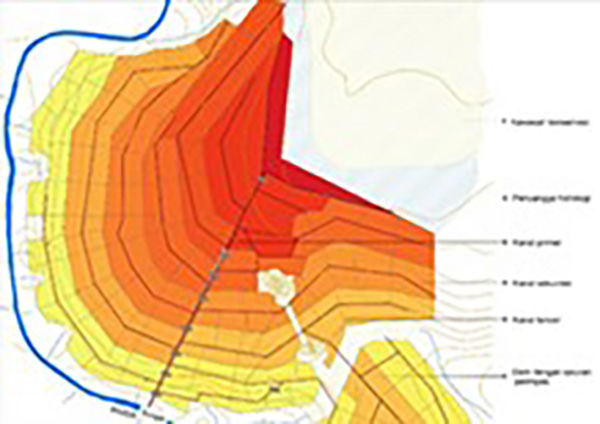
History of Enhancing the Value of Natural Capital
Natural capital refers to the capital created by nature, such as forests, soil, water, air, and biological resources (Ministry of the Environment, Japan, "2014 Biodiversity White Paper") that provides various services to society.
| 2017 |
|
| 2018 |
|
| 2019 |
|
| 2020 |
|
| 2021 |
|
| 2022 |
|
| 2023 |
|
| 2024 |
|
Forest Fire Prevention Measures at Each Work Site
Indonesia
Conventionally, reforestation in peatlands*1 was done by managing the water level with drainage to push water out of the soil. However, while drainage-type water level management works well for plants, it has dried out the land, decomposing organic matter in peat soils and releasing greenhouse gases, as well as leading to large peat fires that are difficult to extinguish.
WSL and MTI, on the other hand, manage stored water levels based on precise surveys and peat studies. This maintains a water level that allows plants to grow and also prevents the land from drying out.
Real-time measurements of peat thickness have shown that peat thickness has not decreased in the long term as a result of previous efforts. In other words, it reduces peat-related greenhouse gas emissions while also helping to avoid fires.
The Sumitomo Forestry Group has also continued to develop the infrastructure technology necessary to manage peatlands since launching the business. The concept is simple, low cost and easy maintainability, which aims to establish management technology that can be broadly expanded in rainforest peatlands throughout Indonesia and the rest of the world. As an alternative means to carry out massive amounts of surveys, we are striving to develop technology using drones and AI.
In addition, Sumitomo Forestry, in cooperation with the governments of Indonesia and Japan, started in August 2024 a demonstration project with the Indonesian government (the former Ministry of Environment and Forestry and Peatland and Mangrove Restoration Agency) to restore degraded peatlands in Central Kalimantan Province. This demonstration site is located in an area where the past Mega Rice Project*2 was carried out and where frequent peat fires have occurred due to improper irrigation systems. Based on the water level management technology developed in West Kalimantan, Sumitomo Forestry will implement infrastructure development, afforestation, and technical and economic demonstrations (in a pilot project) to measure greenhouse gases over three years, starting in 2025.
This pilot project has been developing terrain surveying technology at the demonstration site since February 2024 through a JICA business commercialization demonstration project. From 2025 onward and based on these results, technical and economic demonstrations will be advanced using the Ministry of Economy, Trade and Industry's Global South Future-Oriented Co-creation Project (large-scale demonstrations in ASEAN member countries).
Regions where peatlands thrive, such as the Amazon, the Congo Basin, and Indonesia, have the most rainfall throughout the world. The soil of peatlands is made up of 80% to 90% water. Tropical forests and peatlands act as a pipeline dispersing water into the air from a large amount of rainwater accumulated in the ground during the monsoon season through evaporation. The tremendous evaporation from these rainforests and peatlands has the potential to act as a necessary water cycle function at global scale. The collapse of the world's water cycle will result in abnormal weather and adversely impact agriculture, which will cause even greater food shortage issues. Sumitomo Forestry advocated the importance of proper tropical forest and peatland management because these regions act as the heart of the Earth circulating water throughout the planet at our presentation at The Seventh Tokyo International Conference on African Development (TICAD7) held in Yokohama in August 2019.
*1Characteristics of the peat soil found in the peat swamps is known to emit enormous amounts of greenhouse gases, typically carbon dioxide and methane gas, if the soil was inappropriately exploited. Owing to joint researches by Japanese and Indonesian academic institutes, our operations take into consideration minimizing greenhouse gas emissions that accrue as the peaty soil dissolves during exploitations
*2In 1996, the Indonesian government launched a project aimed at converting one million hectares of peat swamp forest in the southern part of Central Kalimantan Province into rice paddies to address food security issues. The project ended in failure due to a lack of knowledge about peat ecosystems and management techniques. Later, repeated peat fires caused the forests to disappear, with only a small portion remaining
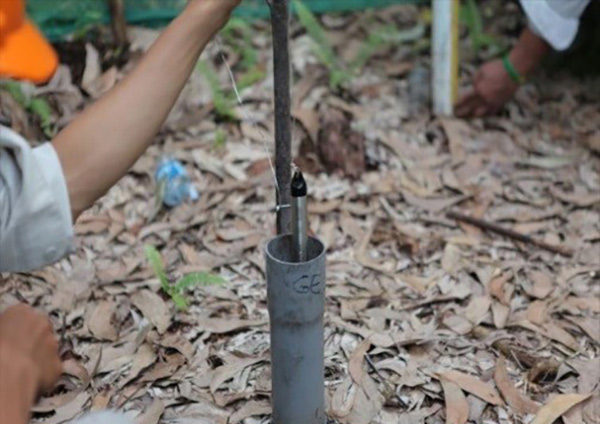
Landscape management of forestry business designed based on detailed data
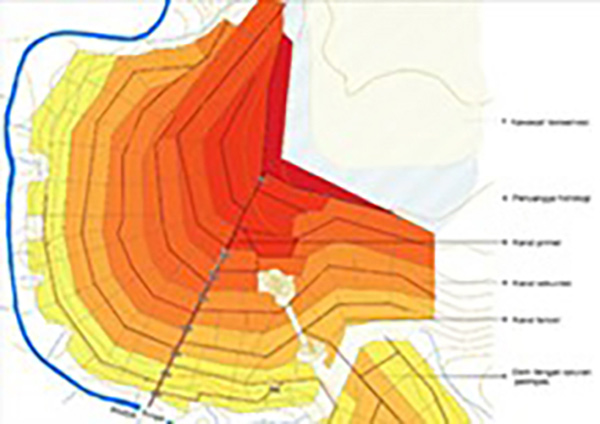
Landscape management of forestry business designed based on detailed data
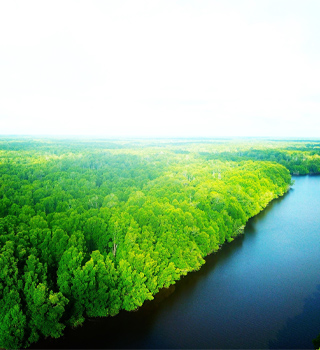
Monitoring the water level in peatlands
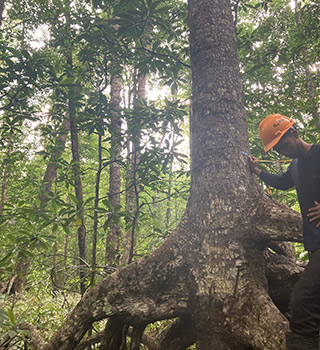
The Water Cycle in Peat Wetlands
Papua New Guinea
Open Bay Timber (OBT) keeps track of the fire hazard levels by analyzing temperature, rainfall, and humidity every day, as well as by preparing firebreaks and organizing forest residues to prevent the spread of fire on the planted forest. In areas with a high risk of fire, patrols of work sites are increased from once to twice a day to meticulously check for signs of fire. Thanks to these initiatives, only one minor forest fire occurred in our managed forests in 2024, with no damage to the planted trees.
New Zealand
TPF is working with Fire and Emergency New Zealand (FENZ), local municipalities, neighboring forestry associations and other relevant agencies to continuously conduct awareness-raising activities about fire in the local community in addition to taking other proactive fire prevention measures. Specific measures include setting up a Fire Index bulletin board that shows the fire risk level, distribution of leaflets to evoke caution in the local community, the creation of a system to always have fire-fighting helicopters on standby when the risk of fire is high, stockpiling of fire extinguishing agent, appropriate placement and management of water ponds, focused pruning of wood edges to prevent the spread of fires, fire-fighting equipment acquisition and training, conducting patrols, and preparation of forest roads. On days with a significantly high risk of fire, we also implement a wide range of regulations from time restrictions for harvesting work to rules on when people have recreational access to the mountains.
Thanks to these initiatives, only two minor forest fires occurred in our managed forests in 2024, with no damage to the planted trees.
Mangrove conservation business
In December 2022, Sumitomo Forestry acquired 100% of PT. BINA OVIVIPARI SEMESTA (BIOS), which owns and manages 9,738 hectares of mangrove forests, making it a wholly owned company. This business aims to create high-quality blue carbon credits by maintaining and managing mangrove forest, which is a globally valuable ecological system, as a "conservation forests" rather than a "working forests" that undergoes a cycle of logging and afforestation.
We will utilize the know-how we have cultivated over many years in sustainable management of peat lands in West Kalimantan Province to engage in wide-area ecosystem conservation projects, regarding mangroves on border between sea and land and peatlands and tropical forests in inland areas as continuous ecosystems. By doing this, we will realize Nature Positive* through maintenance of biodiversity, water purification, and improvement of water retention and water circulation functions.
*To stop and reverse biodiversity loss and put it on a recovery track
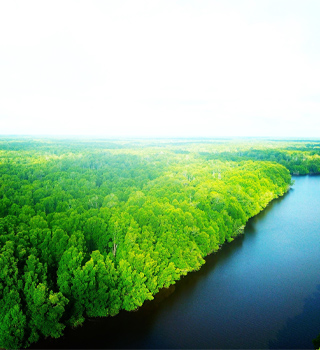
Full view of mangrove forest of BIOS
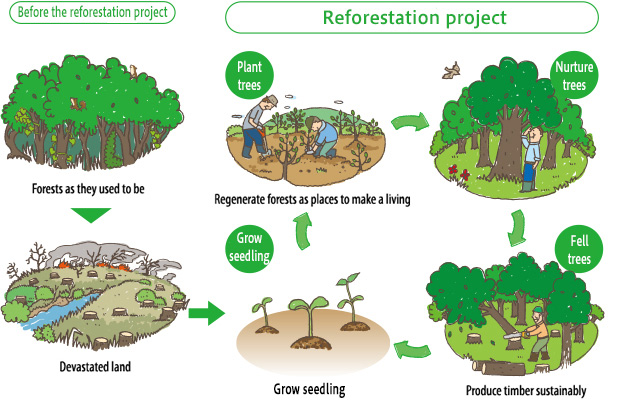
Mangrove conservation business
- Click here for related information
- Home
- Sustainability
- Environment
- Sustainable Forest Management
- Forestry Business Overseas

